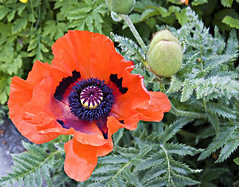Meanwhile, on the other front of the Never-Ending-War, the Taliban is resurgent, the U.S. military apparently has no plan for victory, and Washington doesn't really pay attention. Indiscriminate spraying of the entire countryside is not the solution. How about redeploying troops from Iraq to Afghanistan?
Greg Jaffe writes:
Why Afghan Opium Output Keeps Growing - WSJ.com:
U.S., Afghan and European officials remain divided over how best to deal with the poppy crop, leading largely to inaction.
“There is really no clear consensus from my view for a comprehensive way forward on the counternarcotics in Afghanistan,” said Adm. William Fallon, the top commander of U.S. forces in the region.
European and Afghan officials worry that a very aggressive approach could hurt the local economy and drive farmers to join the Taliban movement. U.S. officials would like to rely on aerial spraying, which is the most effective way to destroy the poppy crop. But Afghan and NATO officials in Afghanistan say such an approach is indiscriminate.
With this conflict-torn country on track to produce another record amount of opium this year, U.S. officials want to significantly step up efforts to eradicate poppy crops before the fall harvest.The problem for the U.S. officials is that their Afghan and North Atlantic Treaty Organization allies oppose their aggressive plans.
The United Nations estimates that farmers in Afghanistan are cultivating about 457,000 acres of poppy, the source of opium. That would represent a 10% increase from last year and an 80% jump from the 254,000 acres harvested in 2005, according to the U.N.
“We are all disappointed with the eradication efforts so far,” said U.S. Ambassador William Wood.
Profits from the opium trade are being used to fund both Taliban insurgents and local warlords' militias. These groups have sapped the influence of the central government in Kabul and contributed to increased unrest in the southern part of the country, where the Taliban movement was born.
Technorati Tags: Afghanistan, Drug_War_insanity, Drug_War_Ridiculousness, opium, Taliban
European and Afghan officials worry that a very aggressive approach could hurt the local economy and drive farmers to join the Taliban movement. U.S. officials would like to rely on aerial spraying, which is the most effective way to destroy the poppy crop. But Afghan and NATO officials in Afghanistan say such an approach is indiscriminate.Instead, U.S. officials are pushing a program to spray poppy crops from the ground. While the Europeans and Afghans believe that some modest eradication must be done through ground-based spraying, they argue that this should be accompanied by a push to provide a realistic economic alternative to growing poppy. The problem is that there is no crop or industry in Afghanistan that can match its profitability.
The U.S., to blunt the impact of spraying on the economy, plans to flood the major poppy-growing provinces in the south with aid. Helmand Province, a Taliban stronghold dominated by the opium trade, is on pace to get about $270 million in aid next year. If it were a country, it would be the fifth-largest recipient of U.S. development aid in the world, Mr. Wood said.
European officials caution that even the massive influx of aid won't make up for the impact of the poppy eradication on the Afghan economy. “The economy of this country is based on the opium trade,” said one senior European official in Afghanistan. “You can't just pull it away. It is a moral dilemma.”


Pretty picture: if that's what they're trying to eradicate in Afghanistan, then it won't make a bit of difference to the opium trade. That's not an opium poppy.
That's one of the common garden poppies derived, in part, from Papaver orientale.
Pretty picture: if that's what they're trying to eradicate in Afghanistan, then it won't make a bit of difference to the opium trade. That's not an opium poppy.
That's one of the common garden poppies derived, in part, from Papaver orientale.
yes, I know, I just liked the photo - from my recent trip to Alaska. You are the first to notice that it isn't an opium poppy though.